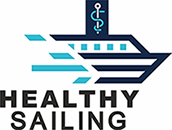Work Packages
HEALTHY SAILING is structured around seven Work Packages responsible for the implementation of project activities and outputs. Task Leaders are responsible for the development of specific tasks for each Work Package.
The activities of each Work Package are highly interconnected, ensuring the project deliverables and results are interoperable.
HEALTHY SAILING Work Packages and overarching structure of project work plan
Work Package 1 is led by the University of Thessaly (Greece) and oversees the overall coordination of activities across all HEALTHY SAILING Work Packages.
The objectives of this Work Package include:
- Managing the project by ensuring it is implemented as planned, demonstrating high-quality scientific leadership across the consortium and at global level, and providing sound financial management.
- Cooperating and coordinating with the Horizon Europe “health ship design” project, EU HEALTHY GATEWAYS and other relevant projects/actions.
Work Package 2 is led by the European Scientific Association for Health and Hygiene in Maritime Transport – EU SHIPSAN ASSOCIATION (Greece) and is responsible for both the design and implementation of HEALTHY SAILING’s dissemination, exploitation and communication activities.
The objectives of this Work Package include:
- Ensuring that knowledge produced about mechanisms of infectious disease spread and measures are publicly available.
- Facilitating the take-up of project outputs in function of ship type, size, type of cruise and cruise destination.
- Contributing upon invitation by CINEA to common information and dissemination activities, with the aim of increasing visibility and synergies between actions support by Horizon Europe/Horizon 2020.
Work Package 3 is led by the University of Greenwich (United Kingdom), and will provide the foundation for information required to develop HEALTHY SAILING outputs including software, training, guidelines, experimental studies and modelling. This Work Package will also be responsible for conducting the risk assessment and infection chain analysis of infectious diseases relevant to large passenger ships. Lastly, this Work Package will include activities for validating HEALTHY SAILING outputs produced under other Work Packages.
The objectives of this Work Package include:
- Establishing an evidence base concerning the specific mechanisms facilitating the on board spread of infection and effectiveness of different mitigation methods.
- Performing pilot-runs and demonstrations to create evidence for the effectiveness, applicability and interoperability of solutions introduced for prevention, mitigation and management measures.
- Integrating evidence produced into project outputs, including guidelines.
Work Package 4 is led by the University of Thessaly (Greece) and will incorporate activities for prevention, mitigation and management measures related to humans for infectious diseases on passenger ships, with emphasis on COVID-19.
The objectives of this Work Package include:
- Developing solutions for improving the prevention, mitigation and management of on board disease and illness in relation to travellers (including passengers and crew members).
- Preventing the rapid spread of communicable infections (COVID-19, influenza, norovirus) amongst passengers and crew members on large passenger ships, particularly cruise ships.
- Achieving early health threat detection systematically on board passenger ships, by developing an integrated e-surveillance system (E-SS) that performs real-time syndromic, laboratory and environmental health surveillance.
- Supporting decision-making for implementing response measures on board passenger ships by producing an Artificial Intelligence (AI) Intelligence Immune System (IIS) for health measures decision making.
Work Package 5 is led by the Leibniz Institute for Plasma Science and Technology (Germany) and will incorporate activities for prevention, mitigation and management measures related to the ship environment, including activities for cleaning, disinfection and water safety measures.
The objectives of this Work Package include:
- Developing solutions to prevent, mitigate and manage the rapid spread of infectious agents in the ship environment that can cause on board disease.
- Contributing to early detection of infectious agents by using reliable laboratory testing methods.
- Contributing to the prevention of waterborne disease, including Legionnaires’ disease, by producing an Artificial Intelligence (AI) Water Safety Plan (WSP).
Work Package 6 is led by the University Medical Center Hamburg-Eppendorf (Germany) and will focus on infectious disease prevention, mitigation and management measures applicable to ports, such as crowd control. This Work Package will also produce best practices for interoperability with ship plans and support activities for international cooperation.
The objectives of this Work Package include:
- Controlling the spread of communicable infections (COVID-19, influenza, norovirus) beyond the vessel into ports and port communities.
- Developing and demonstrating solutions for improving the prevention, mitigation and management of on board disease and illness.
Work Package 7 is led by the University of South-Eastern Norway (Norway) and will focus on increasing knowledge and awareness among crew members, passengers and staff while placing HEALTHY SAILING outputs in the context of social sciences and humanities.
The objectives of this Work Package include:
- Preventing and controlling infectious disease spread through contaminated hands by developing a toolkit for technology induced behavioural change in hand hygiene, incorporating training.
- Increasing knowledge and awareness among crew members, passengers and other staff by providing a blended learning training toolkit enriched with hands-on training (HOT).
- Placing project outputs in the context of the social sciences and humanities (SSH).

